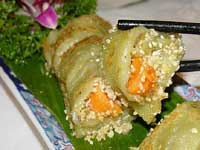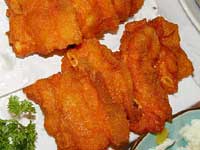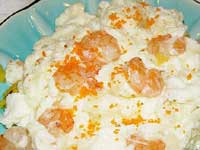|
Anything goes?
By Li Jing ( Beijing Weekend)
Updated: 2004-01-14 10:58
 Among China's four most famous local food styles, Cantonese is acclaimed as the most expensive and using the widest variety of animal meat. Among China's four most famous local food styles, Cantonese is acclaimed as the most expensive and using the widest variety of animal meat.
Cantonese cuisine originates from the region around Guangzhou in South China's Guangdong Province.
A saying popular in China has it that "Guangdong people can eat everything on the ground with four legs except tables and chairs; and they eat everything in the sky except airplanes?
The taste for the exotic is one of the reasons Guangdong was believed to be the origin of SARS.
Cantonese cuisine includes almost all edible food in addition to the staples of pork, beef and chicken ?snakes, snails, insects, worms, chicken feet, duck tongues, ox genitals, entrails and civet.
Despite the countless Cantonese cooking methods, steaming, stir- frying and deep-frying are the most popular cooking methods in restaurants due to the short cooking time and the philosophy of bringing out the flavour of the freshest ingredients.
 Cantonese cuisine can be characterized by the use of very mild and simple spices in combination. Ginger, spring onion, sugar, salt, soy sauce, rice wine, corn starch and oil are sufficient for most Cantonese dishes. Garlic is used heavily in dishes especially with internal organs that have unpleasant odours, such as entrails. Cantonese cuisine can be characterized by the use of very mild and simple spices in combination. Ginger, spring onion, sugar, salt, soy sauce, rice wine, corn starch and oil are sufficient for most Cantonese dishes. Garlic is used heavily in dishes especially with internal organs that have unpleasant odours, such as entrails.
Spicy hot dishes are extremely rare in Cantonese cuisine. Spicy hot food is more common in very hot climates, such as those of Sichuan and Thailand.
Guangdong has the richest food resources in China in terms of agriculture and aquaculture. The copious amount of fresh food and mild weather allows Cantonese cuisine to bring out, rather than drown out, natural flavours.
It is not unusual for a waiter at a Cantonese restaurant to bring the live flipping fish or the crawling lobster to the table to show the patron as proof of freshness before cooking.
Due to Guangdong's proximity to the southern coast of China, fresh live seafood is a speciality.
 From the Cantonese viewpoint, strong spices are added only to stale seafood to cover the rotting odour. The freshest seafood is odour-free and is best cooked by steaming. For instance, only a small amount of soy sauce, ginger, and spring onion is added to a steamed fish. The light seasoning is used only to bring out the natural sweetness of the seafood. From the Cantonese viewpoint, strong spices are added only to stale seafood to cover the rotting odour. The freshest seafood is odour-free and is best cooked by steaming. For instance, only a small amount of soy sauce, ginger, and spring onion is added to a steamed fish. The light seasoning is used only to bring out the natural sweetness of the seafood.
However, most restaurants gladly get rid of their stale seafood inventory by offering dishes loaded with garlic and spices. As a rule of thumb in Cantonese dining, the spiciness of a dish is usually inversely proportional to the freshness of the ingredients.
Another unique Cantonese specialty is slow-cooked soup. This is almost unheard of in any other Chinese cuisines. The soup is usually a clear broth prepared by simmering meat and other ingredients for several hours. Sometimes, Chinese herbal medicines are added to the pot.
Restaurants offering Cantonese cuisine are well-decorated. A gathering in a Cantonese restaurant usually means a luxury affair among businesses or a place to show respect to friends.
Cantonese cuisine restaurants are not as popular as Sichuan-or Shandong-style food in Beijing. Yet there's no shortage of options in the capital.
|
Cantonese cuisine in Beijing
|
| Yunlaitang Restaurant |
Location: 2nd floor, Beijing Hotel
Open hours: 11 am to 2 pm; 6 pm to 9 pm
Tel: 6513-7766 ext 1389 |
| Shun Feng Seafood Restaurant |
Location: 34 Dong'anmen Dajie
Open hours: 10:30 am to 2 pm; 4:30 pm to 9 pm
Tel: 6524-5833 |
| Beijing UDO Seafood Restaurant |
Location: East Gate of the Worker's Stadium
Open hours: 11 am to 11 pm
Tel: 6508-5845 |
| Lichang Seafood Restaurant |
Location: 37 Huguosi Dajie, Xicheng District.
Open hours: 24 hours
Tel: 6618-9937 |
| Dasanyuan Restaurant |
Location: 50 Jingshanxijie, Xicheng District.
Open hours: 10:30 am to 2 pm; 5 pm to 9:30 pm
Tel: 6401-3920 |
| Dragons Restaurant |
Location: 1/B, Beijing Kempinski Hotel
Open hours: 11 am to 2:30 pm, 5:30 pm to 11:30 pm
Tel: 6465-3388 |
| Chao Tasty Seafood Restaurant |
Location: 10 Chaoyangmenwai Dajie.
Open hours: 10 am to 2 pm, 5 pm to 10 pm
Tel: 6599-5329 |
| Gangwan Restaurant |
Location: 1 Sanlitunlu, Chaoyang District.
Open hours: 11 am to 2:30 pm, 5 pm to 10 pm
Tel: 6462-3151 |
| Ayi Abalone Restaurant |
Location: 1st floor, Jinqiao Mansion, A1 Jianguomenwai Dajie.
Open hours: 10:30 am to 2:30 pm, 5:30 pm to 10:30 pm
Tel: 6507-9256 |
| China Garden |
Location: Holiday Inn Lido Beijing
Open hours: 11:30 am to 2 pm, 6 pm to 10 pm
Tel: 6437-6688 |
| Perfect House Restaurant |
Location: Hall 5 Agricultural Exhibition Hall, 16 Dongsanhuan Beilu, Chaoyang District.
Open hours: 11 am to 2:30 pm, 5 pm to 11:30 pm
Tel: 6592-3388 |
| Haomen Restaurant |
Location: 34 Xibahe Zhongli, Chaoyang District.
Open hours: 11 am to 10 pm
Tel: 6465-2743 |
| Baiwanzhuangyuan Restaurant |
Location: 28 Zhanlanlu, Xicheng District.
Open hours: 11 am to 2 pm, 5 pm to 9 pm
Tel: 6831 5058 |
| Dafuhao Chaozhou Seafood Restaurant |
Location: 5 Weigongcunlu, Haidian District.
Open hours: 10 am to 2 pm, 5 pm to 9:30 pm
Tel: 6842-2642 |
| Kanianhua Restaurant |
Location: 55 Qianmen Xidajie, Xicheng District.
Open hours: 11 am to 2:30 pm, 5 pm to 10:30 pm
Tel: 6492-3606 |
| Shaoerzai |
Location: 4 Jianguomenwai Dajie
Open hours: 11 am to 9:30 pm
Tel: 6503-2978 |
|
